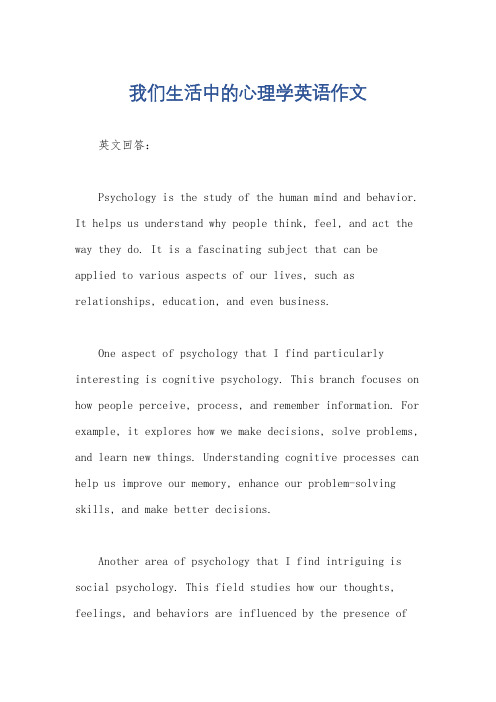外文资料翻译-- 生活中的心理学
生活中的心理学(文稿)

生活中的心理学蝴蝶效应1960年,美国麻省理工学院教授洛伦兹研究“长期天气预报”问题时,出现了疑难问题:她在计算机上用一组简化数据模拟天气的演变,原本是想利用计算机的高速运算来提高天气预报的准确性。
但是,事与愿违,多次计算表明,初始条件的极微小差异,会导致错误的结论。
心理情绪也是如此,有一组漫画显示,一个人在单位被领导训了一顿,心里很恼火,回家冲妻子发起了脾气,妻子无来由地被训,也很生气,就摔门而去。
走在街上,一条宠物狗拦住了去路,“汪汪”狂吠,妻子更生气啦,就一脚踢过去,小狗受到踢打,狂奔路过一个老人面前,把老人吓了一跳。
正巧这位老人有心脏病,被突然冲出的小狗一吓,当场心脏病发作,不治身亡。
洛伦兹发现了微小差异导致的巨大反差,她用一个形象的比喻来表达这个发现,一只小小的蝴蝶在巴西上空振动翅膀,它煽动起来的小小漩涡与其他气流汇合,可能在一个月后的美国得克萨斯州会引起一场风暴——这就是混沌学中著名的“蝴蝶效应”。
蝴蝶效应在心理学方面的应用:蝴蝶效应指一件表面上看来毫无关系、非常微小的事情,可能带来巨大的改变。
此效应说明,事物发展的结果,对初始条件具有极为敏感的依赖性,初始条件的极小偏差,将会引起结果的极大差异。
当一个人小时候受到微小的心理刺激,长大后这个刺激会被放大,电影《蝴蝶效应》中作了精彩诠释青蛙现象:青蛙效应强调的便是“生于忧患,死于安乐”的道理。
人天生就是有惰性的,总愿意安然现状,不到迫不得已多半不愿意去改变已有的生活。
若一个人久久沉迷于这种无变化、安逸的生活时,就往往忽略了周遭环境等等变化,当危机到来时就像那青蛙一样只能坐以待毙。
鲶鱼效应从前,挪威人在海上捕得沙丁鱼后,如果能让它们活着抵港,卖价就会比死鱼高好几倍,但只有一条渔船能做到带活鱼回港。
后来,人们发现这条船的鱼槽内不过是多了一条鲶鱼而已。
原来当鲶鱼装入鱼槽后,由于环境陌生,就会四处游动,而沙丁鱼发现这一“异类”后,也会因紧张而加速游动。
心理学50个常见的心理效应以及在现实生活中的示例

心理学50个常见的心理效应以及在现实生活中的示例心理学中存在许多有趣的心理效应,这些效应揭示了人类思维和行为背后的复杂机制。
在现实生活中,这些心理效应不仅可以帮助我们更好地理解自己和他人,还能指导我们在各种情境下做出更明智的选择。
1.选择支持效应(Choice-supportive bias):当我们做出一个选择后,往往会过度强调选择的好处,忽视其缺点。
比如购买了一部新手机后,我们可能会主动寻找该手机的优点,而忽略它的缺陷。
2.认知失调理论(Cognitive dissonance theory):人们在面对相互矛盾的态度或行为时,会感到不适,从而寻求方式来减轻这种不适。
比如抽烟者知道吸烟有害健康,但仍寻找各种理由来解释自己的吸烟行为。
3.锚定效应(Anchoring effect):当我们面临决策时,通常会受到先前接触到的信息或“锚点”的影响。
比如在购物时看到标价较高的商品后,我们可能会觉得其他商品的价格相对便宜。
4.羊群效应(Herd mentality):人们倾向于跟随大多数人的行为或意见,而不是做出独立的决策。
例如在股市中,当大多数投资者纷纷买入某只股票时,其他投资者也会跟风买入,导致股价上涨。
5.暗示效应(Halo effect):一个人的某一积极特征会影响他人对该人其他特征的评价。
比如长相英俊的人可能会被认为性格好,即使实际上并非如此。
6.频率错觉(Frequency illusion):一旦我们注意到某一事物,就会开始在日常生活中频繁遇到它。
比如了解了一种新词汇后,会发现这个词汇在接下来的日常交流中屡见不鲜。
7.漂亮女孩效应(The Cheerleader Effect):在群体中,个体看起来更吸引人的效果。
一组人员看起来比其中的一个人更有吸引力。
1。
我们生活中的心理学英语作文

我们生活中的心理学英语作文英文回答:Psychology is the study of the human mind and behavior. It helps us understand why people think, feel, and act the way they do. It is a fascinating subject that can be applied to various aspects of our lives, such as relationships, education, and even business.One aspect of psychology that I find particularly interesting is cognitive psychology. This branch focuses on how people perceive, process, and remember information. For example, it explores how we make decisions, solve problems, and learn new things. Understanding cognitive processes can help us improve our memory, enhance our problem-solving skills, and make better decisions.Another area of psychology that I find intriguing is social psychology. This field studies how our thoughts, feelings, and behaviors are influenced by the presence ofothers. It examines topics such as conformity, obedience, and persuasion. For instance, social psychologists have conducted experiments to understand why people tend to conform to group norms, even if it goes against their own beliefs. This knowledge can be applied to various real-life situations, such as marketing strategies or creating inclusive communities.In addition to cognitive and social psychology, there are many other branches of psychology that contribute to our understanding of human behavior. For example, developmental psychology focuses on how people change and develop throughout their lives. It examines the physical, cognitive, and social changes that occur from infancy to old age. This knowledge can be used to design effective educational programs or interventions for individuals at different stages of life.Clinical psychology is another important branch of psychology. It focuses on the diagnosis and treatment of mental health disorders. Clinical psychologists work with individuals who are experiencing psychological distress andhelp them improve their well-being. They use various therapeutic techniques, such as cognitive-behavioral therapy, to help clients overcome their challenges and lead fulfilling lives.Overall, psychology is a diverse and fascinating field that has practical applications in our everyday lives. It helps us understand ourselves and others better, and it provides valuable insights into human behavior. By studying psychology, we can gain a deeper understanding of whypeople think, feel, and behave the way they do.中文回答:心理学是研究人类思维和行为的学科。
1.生活中的心理学

心理学者的与“众”不同
——心理学的科学研究方法
常识往往是模棱两可的、 含糊的;常识来源于个别经验 或主观臆断,因而往往是片面 的甚至是错误的。 心理学结论是明确的、 具体的;心理学结论来源于 系统研究的客观事实或严格 控制的科学实验。
通过事实而不是辩论来解决争论——科学理论需 要经受严格的考验,在理论被认为是可靠的之前,它 的结果必须能够被其他的研究者重复。
心理学与生活
授课教师:李悦
ቤተ መጻሕፍቲ ባይዱ一讲
生活中的心理学 ——课程导论
心理学:一门探索人类奥秘的科学
我深信,心灵的探讨必定会成为未来一 门重要的科学...... 这是一门我们最迫切需要 的科学。因为世界发展的趋势显示,人类最 大的敌人不在于饥荒、地震、病菌戒癌症, 而是在于人类本身,因为,就目前而言,我 们仍然没有任何适当的方法,来防止远比自 然灾害更危险的人类心灵疾病的蔓延。
心理学研究什么?
心理学是研究心理和行为的科学,其目标是描 述、解释、预测和帮助控制行为。
临床心理学
教育心理学 普通心理学
生理心理学
基础 领域
应用 领域
管理心理学
工程心理学 社会心理学
发展心理学
心理学发展中的里程碑
冯特
弗洛 伊德
华生
罗杰斯
费斯 廷格
1879
1900
1913
1951
1957
心理学者眼中的心理现象
——《心理学导论》([美]Dennis Coon) ----荣格
第一讲
生活中的心理学 ——课程导论
心理学:一门探索人类奥秘的科学
在今天的美国,有3000多所大学有心理学学位教育,不少大学每年 主修心理学的学生超过千人;全美每年授予博士学位人数最多的学科是 心理学;书店里书籍最多最丰富的领域之一是心理学;社会对专业工作 者需求最旺盛的领域之一也包括心理学„„这体现了心理学这样一个学 科在一个发达工业国家里所具有的影响。 改革开放后,中国心理学得到复兴,经过自20世纪80年代后的努力, 我国的心理学终于进入蓬勃发展的时期。目前国内设立心理学系和心理 学专业的高校已达到300多所,在校学习心理学的大学生、研究生近万 人。近年,社会各行各业对心理学方面的人才需求旺盛,不仅从事心理 学专业研究、心理咨询成为热门职业,商品营销、企业管理、人事管理、 教育机构等都对心理学专业人才表现出浓厚兴趣。同时,越来越多的人 认为心理学方面的知识有助于自己发展得更好,从而使心理学专业成为 高校招生的热门。但总体来说,我国心理学仍相对较弱,在科学研究和 教育实践方面的积累仍很有限。心理学的基础教育和普及成为我国心理 学发展的最重要环节之一。
第一章 生活中的心理学

第一章生活中的心理学一、心理学为何独具特色定义心理学(psychology):关于个体的行为及心智(mind)过程的科学研究行为(behavior)是有机体适应环境的方式。
心理学的目标描述,解释,预测,控制分析水平,从最宽的整体到最细微的具体水平。
行为数据是关于机体的行为及行为发生条件的观察报告。
Stop停下来检查一下❖心理学定义的四个成分是什么?科学,行为,个体和心智。
❖心理学家的四个目标是什么?描述,解释,预测和控制。
❖为什么解释行为和预测行为总是紧密联系?对造成特定行为方式潜在原因的精确解释,常常能让研究者对未来的行为做出精确的预测。
二、现代心理学的发展心理学的历史根基赫尔曼.艾宾浩斯(Hermann Ebbinghas,1850-1909):“心理学有这漫长的过去,但只有短暂的历史”威廉.冯特(Wilhelm Wundt,1832-1920 )于1879年在德国莱比锡建立了第一个正式的实验心理学实验室。
出版了《生理心理学原理》(Principles ofPhysiological Psychology )爱德华.铁钦纳(Edward Titchener,1867-1927)在康奈尔大学建立了一个实验室。
威廉.詹姆士(William James,1842-1910)撰写了《心理学原理》(The PrinciplesOf Psychology)1892年,斯坦利.霍尔(G.Stanley hall)创立了美国心理学协会(APA)结构主义:对科学方法,精确测量以及数据统计分析的强调,体现了冯特心理学的传统特色。
内省法(introspection),即由个体系统地检查自己有关特定感官经验的思维和感受。
铁钦纳强调“什么”是心理的内容。
结构主义的一个重要分支,由德国心理学家马克斯.惠特海默(Max Wertheimer,1880-1943)开创的,强调心理是以格式塔(有组织的整体)的方式理解许多经验,而不是简单部分的总和。
生活中的心理学

生活中的心理学 戴吉
生活中的心理学 戴吉
二、主要流派
2、行为主义学派 、
代表人物:华生和斯金纳, 代表人物:华生和斯金纳,后期班图拉
产生于上世纪初的美国,到50年代整整 年在美国 年代整整30年在美国 产生于上世纪初的美国, 上世纪初的美国 年代整整 心理学研究中一直处于统治位置 。 主张心理学应去研究那种从人的意识中折射出来的看 得见、摸得着的客观东西, 人的行为。 得见、摸得着的客观东西,即人的行为。 解释人的一切行为的公式: 解释人的一切行为的公式: “S----R”(刺激一反应) (刺激一反应)
生活中的心理学 戴吉
生活中的心理学 戴吉
生活中的心理学 戴吉
生活中的心理学 戴吉
疯狂的螺帽
疯狂的螺帽:你知道直钢棒是怎 样神奇地穿过这两个看似乎成直 角的螺帽孔的吗? 【解析】两个螺帽实际是中空的, 虽然它们看起来是凸面的,所以 两个螺帽并不互相垂直。螺帽被 下方光源照到(一般光线应来自 上方),这给人们判断他们的真 实三维形状提供了错误信息。美 国魔术世界里·安德鲁斯创造了这 个精彩的幻觉作品。 。
主题统觉测验
生活中的心理学 戴吉
生活中的心理学 戴吉
罗 夏 墨 迹 测 验
生活中的心理学 戴吉
生活中的心理学 戴吉
生活中的心理学 戴吉
生活中的心理学 戴吉
生活中的心理学 戴吉
二、主要流派 4、认知心理学派 、
产生于上世纪70年代初,目前,正处于高潮。 产生于上世纪 年代初,目前,正处于高潮。 年代初 强调人是进行信息加工的生命机体, 强调人是进行信息加工的生命机体,人对外 界的认知实际就是一种信息的接受、编码、操作、 界的认知实际就是一种信息的接受、编码、操作、 信息的接受 的过程。 提取和使用的过程 提取和使用的过程。
心理学与生活在线阅读(全)

心理学与生活在线阅读(全)《心理学与生活》(Psychology and Life),为美国心理学家Floyd L. Ruch撰写的一部心理学教科书著作。
此书历经十九次改版,在第八版(1971年)时菲利普津巴多加入改版,最新版本则由津巴多及理查德格里格合作撰写。
《心理学与生活》是一本优秀的、经典的心理学教科书,不仅在美国,在全世界许多国家的心理学界都有着极高的知名度,是心理学基础教材中第一品牌书、被美国ETS(美国教育考试服务中心)推荐为GRE(美国研究生入学考试)心理学专项考试的主要参考用书。
是美国斯坦福大学多年来使用的教材,也是在美国许多大学里的"普通心理学"(General Psychology)课程选用的经典教材。
作为一本包含着丰富的教育思想和独特教学方法的成熟教材,原书中所有元素--如由600余条词汇及解释组成的"专业术语表",2000余条"参考文献",以及近1000条的"人名和主题索引"等等,对于教学、研究和学习都十分宝贵,此中译本完整地翻译和保留了这些资料。
心理学与生活在线阅读第一章生活中的心理学一、心理学为何独具特色1、定义心理学(psychology):关于个体的行为及精神过程的科学的研究。
科学的方法(scientific method)包括一套用来分析和解决问题的有序步骤。
这种方法用客观收集到的信息作为得出结论的事实基础。
(另定义见第二章)行为(behavior):机体适应环境的方式。
2、心理学的目标基础研究的目的是描述、解释、预测和控制行为、提高人类生活的质量。
(1)描述发生的事情行为数据(behavioral data):是关于机体的行为和行为发生时环境的观察报告。
选择一个适宜的分析水平。
按照事实的本相去收集它们(2)解释发生的事情通常承认大多数行为受到一些因素的共同影响,行为的这些内部决定因素叫做机体变量(organismic variables)。
《生活中的心理学》课件

家庭成员之间的互动和沟通是影响家庭和 谐的重要因素,心理学知识可以帮助家庭 成员更好地理解和支持彼此。
对未来的展望
1 2 3
心理学与科技的结合
随着科技的不断发展,心理学将与科技更加紧密 地结合,例如利用大数据和人工智能进行心理评 估和干预。
跨学科合作
心理学将与更多学科进行交叉合作,例如医学、 生物学、教育学等,以更全面地了解人类行为和 心理过程。
抑郁
抑郁是一种情绪低落的状态,常伴随 着悲伤、无助、失去兴趣和活力等症 状。严重抑郁可能导致自杀意念或行 为,需要及时寻求专业帮助。
人际关系问题
人际冲突
人际冲突是生活中常见的困扰,表现为与家人、朋友、同事 等关系中的矛盾和争吵。处理人际冲突需要良好的沟通技巧 和情绪管理能力。
人际疏离
人际疏离是指个体感到孤独和与他人隔绝的状态。长期的人 际疏离可能影响心理健康,增加抑郁和焦虑的风险。
动机与需求
人类行为受到内在动机和 需求的驱动,了解这些有 助于理解个体行为。
情绪与情感
情绪和情感影响个体的认 知和行为,对个体的心理 健康和生活质量有重要影 响。
社会心理学:人际互动与影响
社会认知
社会认知是个体如何理解 自己和他人,以及如何形 成对他人的印象。
社会影响
社会影响是个体在群体中 的行为受到其他人的影响 。
05
如何提升生活中的心理学 素养
增强心理素质
自我认知
了解自己的优点和不足,接受自 己的不完美,从而增强自信心。
情绪调节
学会控制自己的情绪,避免情绪 波动过大对生活造成负面影响。
应对压力
掌握应对压力的方法,如放松训 练、积极应对等,提高抗压能力
。
提高情绪管理能力
- 1、下载文档前请自行甄别文档内容的完整性,平台不提供额外的编辑、内容补充、找答案等附加服务。
- 2、"仅部分预览"的文档,不可在线预览部分如存在完整性等问题,可反馈申请退款(可完整预览的文档不适用该条件!)。
- 3、如文档侵犯您的权益,请联系客服反馈,我们会尽快为您处理(人工客服工作时间:9:00-18:30)。
Psychology and LifeWhen you begin your introductory course in psychology, you may be quite pleasantly surprised by the wide-ranging terrain of contemporary psychology. Psychology and Life will reveal the intricacies of your human experience through rigorous research. Psychology and Life will lead you from the inner spaces of brain and mind to the outer dimensions of human behavior. We will investigate the processes that provide meaningful structure to your experiences, such as how you perceive the world, communicate, learn, think, and remember. We will try to understand the more dramatic expressions of human nature, such as how and why people dream, fall in love, act aggressively, and become mentally ill.Finally, we will demonstrate how psychological knowledge can be used to understand and change cultural forces at work in our lives. As authors of Psychology and Life, we believe in the power of psychological expertise. The appeal of psychology has grown personally for us over our careers as educators and researchers. In recent years, there has been a virtual explosion of new information about the basic mechanisms that govern mental and behavioral processes. As new ideas replace or modify old ideas, we are continually intrigued and challenged by the many fascinating pieces of the puzzle of human nature.Foremost in the journey will be a scientific quest or understanding. We shall inquire about the how, what, when, and why of human behavior and about the causes and consequences of behaviors you observe in yourself, in other people, and in animals. We will explain why you think, feel, and behave as you do. What makes you uniquely different from all other people? Yet why do you often behave so much like others? Are you molded by heredity, or are you shaped more by personal experiences? How an aggression and altruism, love and hate, and madness and creativity exist side by side in this complex creature-the human animal?To appreciate the uniqueness and unity of psychology, you must consider the way psychologists define the field and the goals they bring to their research and applications. By the end of the book, we will encourage you to think like a psychologist. In this first section, we’ll give you a strong idea of what that might mean.Many psychologists seek answers to this fundamental question: what is human nature? Psychology answers this question by looking at processes that occur within individuals as well as forces that arise within the physical and social environment. In this light, we formally define psychology as the scientific study of the behavior of individuals and their mental processes. Let’s explore the critical parts of this definition: scientific, behavior, individual, and mental.The scientific aspect of psychology requires that psychological conclusions be based on evidence collected according to the principles of the scientific method. The scientific method consists of a set of orderly steps used to analyze and solve problems. This method uses objectively collected information as the factual basis for drawing conclusions. We will elaborate on the features of the scientific method more fully in Chapter 2, when we consider how psychologists conduct their research.Behavior is the means by which organisms adjust to their environment. Behavior is action. The subject matter of psychology largely consists of the observable behavior of humans and other species of animals. Smiling, crying, running, hitting, talking, and touching are some obvious examples of behavior you can observe. Psychologists examine what the individual does and how the individual goes about doing it within a given behavioral setting and in the broader social or cultural context.The subject of psychological analysis is most often an individual-a newborn infant, a teenage athlete, a college student adjusting to life in a dormitory, a man facing a midlife career change, or a woman coping with the stress of her husband’s deterioration from Alzheimer’s disease. However, the subject might also be a chimpanzee learning to use symbols to communicate, a white rat navigating a maze, or a sea slug responding to a danger signal. An individual might be studied in its natural habitat or in the controlled conditions of a research laboratory.Many researchers in psychology also recognize that they cannot understand human actions without also understanding mental processes, the workings of the human mind. Much human activity takes place as private, internal events-thinking, planning, reasoning, creating, and dreaming. Many psychologists believe that mental processes represent the most important aspect of psychological inquiry. As you shall soon see, psychological investigators have devised ingenious techniques to study mental events and processes-to make these private experiences public.The combination of these concerns defines psychology as a unique field. Within the social sciences, psychologists focus largely on behavior in individuals, whereas sociologists study the behavior of people in groups or institutions, and anthropologists focus on the broader context of behavior in different cultures: Even so, psychologists draw broadly from the insights of other scholars. Psychologists share many interests with researchers in biological sciences, especially with those who study brain processes and the biochemical bases of behavior. As part of the emerging area of cognitive science, psychologists’questions about how the human mind works are related to research and theory in computer science, artificial intelligence, and applied mathematics. As a health science-with links to medicine, education, law, and environmental studies-psychology seeks to improve the quality of each individual’s and the collective’s well-being.Although the remarkable breadth and depth of modern psychology are a source of delight to those who become psychologists, these same attributes make the field a challenge to the student exploring it for the first time. There is so much more to the study of psychology than one expects initially-and, because of that, there will also be much of value that you can take away from this introduction to psychology. The best way to learn about the field is to learn to share psychologists’ goals. Let’s consider those goals.To appreciate the uniqueness and unity of psychology, you must consider the way psychologists define the field and the goals they bring to their research and applications. By the end of the book, we will encourage you to think like a psychologist. In this first section, we’ll give you a strong idea of what that might mean.Many psychologists seek answers to this fundamental question: what is human nature? Psychology answers this question by looking at processes that occur within individuals as well as forces that arise within the physical and social environment. In this light, we formally define psychology as the scientific study of the behavior of individuals and their mental processes. Let’s explore the critical parts of this definition: scientific, behavior, individual, and mental.The scientific aspect of psychology requires that psychological conclusions be based on evidence collected according to the principles of the scientific method. The scientific method consists of a set of orderly steps used to analyze and solve problems. This method uses objectively collected information as the factual basis for drawing conclusions. We will elaborate on the features of the scientific method more fully in Chapter 2, when we consider how psychologists conduct their research.Behavior is the means by which organisms adjust to their environment. Behavior is action. The subject matter of psychology largely consists of the observable behavior of humans and other species of animals. Smiling, crying, running, hitting, talking, and touching are some obvious examples of behavior you can observe. Psychologists examine what the individual does and how the individual goes about doing it within a given behavioral setting and in the broader social or cultural context.The subject of psychological analysis is most often an individual-a newborn infant, a teenage athlete, a college student adjusting to life in a dormitory, a man facing a midlife career change, or a woman coping with the stress of her husband’s deterioration from Alzheimer’s disease. However, the subject might also be a chimpanzee learning to use symbols to communicate, a white rat navigating a maze, or a sea slug responding to a danger signal. An individual might be studied in its natural habitat or in the controlled conditions of a research laboratory.Many researchers in psychology also recognize that they cannot understandhuman actions without also understanding mental processes, the workings of the human mind. Much human activity takes place as private, internal events-thinking, planning, reasoning, creating, and dreaming. Many psychologists believe that mental processes represent the most important aspect of psychological inquiry. As you shall soon see, psychological investigators have devised ingenious techniques to study mental events and processes-to make these private experiences public.The combination of these concerns defines psychology as a unique field. Within the social sciences, psychologists focus largely on behavior in individuals, whereas sociologists study the behavior of people in groups or institutions, and anthropologists focus on the broader context of behavior in different cultures: Even so, psychologists draw broadly from the insights of other scholars. Psychologists share many interests with researchers in biological sciences, especially with those who study brain processes and the biochemical bases of behavior. As part of the emerging area of cognitive science, psychologists’questions about how the human mind works are related to research and theory in computer science, artificial intelligence, and applied mathematics. As a health science-with links to medicine, education, law, and environmental studies-psychology seeks to improve the quality of each individual’s and the collective’s well-being.Although the remarkable breadth and depth of modern psychology are a source of delight to those who become psychologists, these same attributes make the field a challenge to the student exploring it for the first time. There is so much more to the study of psychology than one expects initially-and, because of that, there will also be much of value that you can take away from this introduction to psychology. The best way to learn about the field is to learn to share psychologists’ goals. Let’s consider those goals.The goals of the psychologist conducting basic research are to describe, explain, predict, and control behavior. These goals form the basis of the psychological enterprise. What is involved in trying to achieve each of them?The first task in psychology is to make accurate observations about behavior. Psychologists typically refer to such observations as their data (data is the plural, datum the singular).Behavioral data are reports of observations about the behavior of organisms and the conditions under which the behavior occurs. When researchers undertake data collection, they must choose an appropriate level of analysis and devise measures of behavior that ensue objectivity.In order to investigate an individual’s behavior, researchers may use different levels of analysis-from the broadest, most global level down to the most minute, specific level. Suppose, for example, you were trying to describe a painting you saw at a museum . At a global level, you might describe it by title, Bathers, and by artist,Georges Seurat. At a more specific level, you might recount features of the painting: some people are sunning themselves on a riverbank, while others are enjoying in water, and so on. At a very specific level, you might describe the technique Seurat used-tiny points of paint-to create the scene. The description at each level would answer different questions about the painting.Different levels of psychological description also address different questions. At the broadest level of psychological analysis, researchers investigate the behavior of the whole person within complex social and cultural contexts. At this level, researches might study cross-cultural differences in violence, the origins of prejudice, and the consequences of mental illness. At the next level, psychologists focus on narrower, finer units of behavior, such as speed of reaction to a stop light, eye movements during reading, and grammatical errors made by children acquiring language. Researchers can study even smaller units of behavior. They might work to discover the biological bases of behavior by identifying the places in the brain where different types of memories are stored, the biochemical changes that occur during learning, and the sensory paths responsible for vision or hearing. Each level of analysis yields information essential to the final composite portrait of human nature that psychologists hope ultimately to develop.However tight or broad the focus of the observation, psychologists strive to describe behavior objectively. Collecting the facts as they exist, and not as the researcher expects or hopes them to be, is of utmost importance. Because every observer brings to each observation his or her subjective point of view- biases, prejudices, and expectations—it is essential to prevent these personal factors from creeping in and distorting the data. As you will see in the next chapter, psychological researchers have developed a variety of techniques to maintain objectivity.While descriptions must stick to perceivable information, explanations deliberately go beyond what can be observed. In many areas of psychology, the central goal is to find regular patterns in behavioral and mental processes. Psychologists want to discover how behavior works. Why do you laugh at situations that differ from your expectations of what is coming next? What conditions could lead someone to attempt suicide or commit rape?Explanations in psychology usually recognize that most behavior is influenced by a combination of factors. Some factors operate within the individual, such as genetic makeup, motivation, intelligence level, or self-esteem. These inner determinants tell something special about the organism. Other factors, however, operate externally. Suppose, for example, that a child tries to please a teacher in order to win a prize or that a motorist trapped in a traffic jam becomes frustrated and hostile. These behaviors are largely influenced by events outside the person. When psychologistsseek to explain behavior, they almost always consider both types of explanations. Suppose, for example, psychologists want to explain why some people start smoking. Researchers might examine the possibility that some individuals are particularly prone to risk taking (an internal explanation) or that some individuals experience a lot of peer pressure (an external explanation)—or that both a disposition toward risk taking and situational peer pressure are necessary (a combined explanation).Often a psychologist’s goal is to explain a wide variety of behavior in terms of one underlying cause. Consider a situation in which your teacher says that to earn a good grade; each student must participate regularly in class discussions. Your roommate, who is always well prepared for class, never raises his hand to answer questions or volunteer information. The teacher chides him for being unmotivated and assumes he is not bright. That same roommate also goes to parties but never asks anyone to dance, doesn’t openly defend his point of view when it is challenged by someone less informed, and rarely engages in small talk at the dinner table. What is your diagnosis? What underlying cause might account for this range of behavior? How about shyness? Like many other people who suffer from intense feelings of shyness, your roommate is unable to behave in desired ways . We can use the concept of shyness to explain the full pattern of your roommate’s behavior.To forge such causal explanations, researchers must often engage in a creative process of examining a diverse collection of data. Master detective Sherlock Holmes drew shrewd conclusions from scraps of evidence. In a similar fashion, every researcher must use an informed imagination, which creatively synthesizes what is known and what is not yet known. A well-trained psychologist can explain observations by using her or his insight into the human experience along with the facts previous researchers have uncovered about the phenomenon in question. Much psychological research attempts to determine which of several explanations most accurately accounts for a given behavioral pattern。
